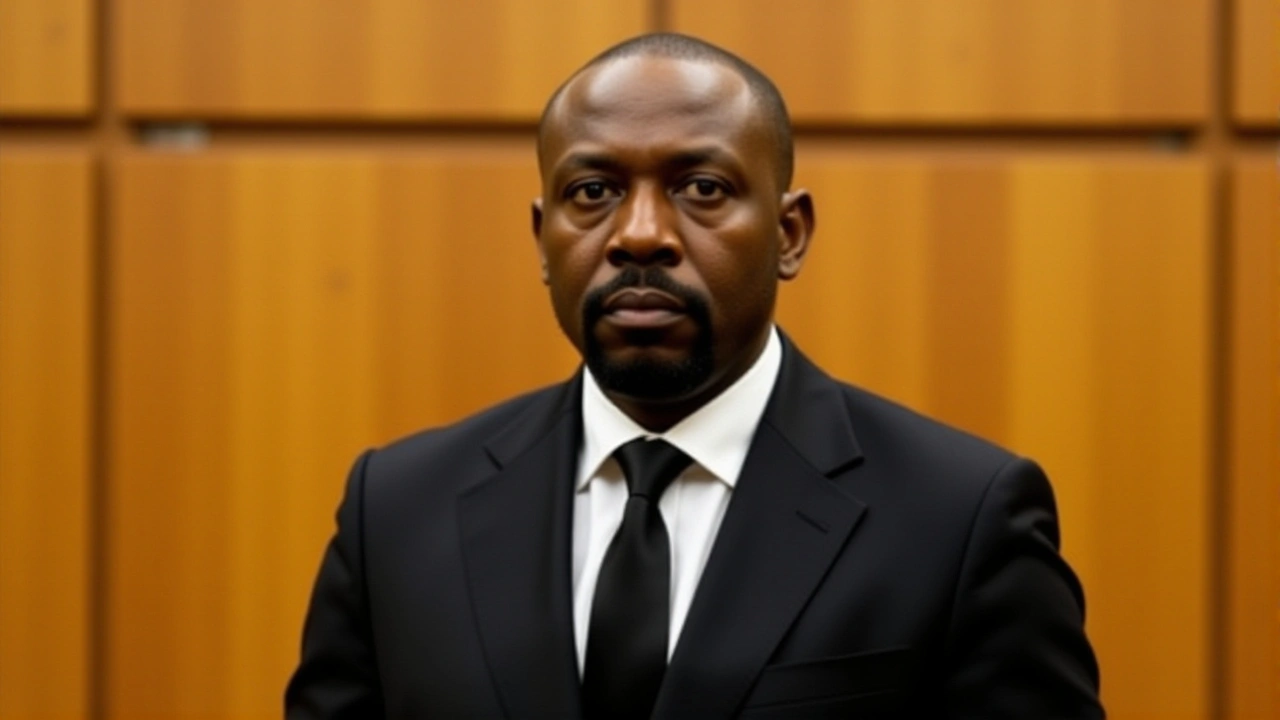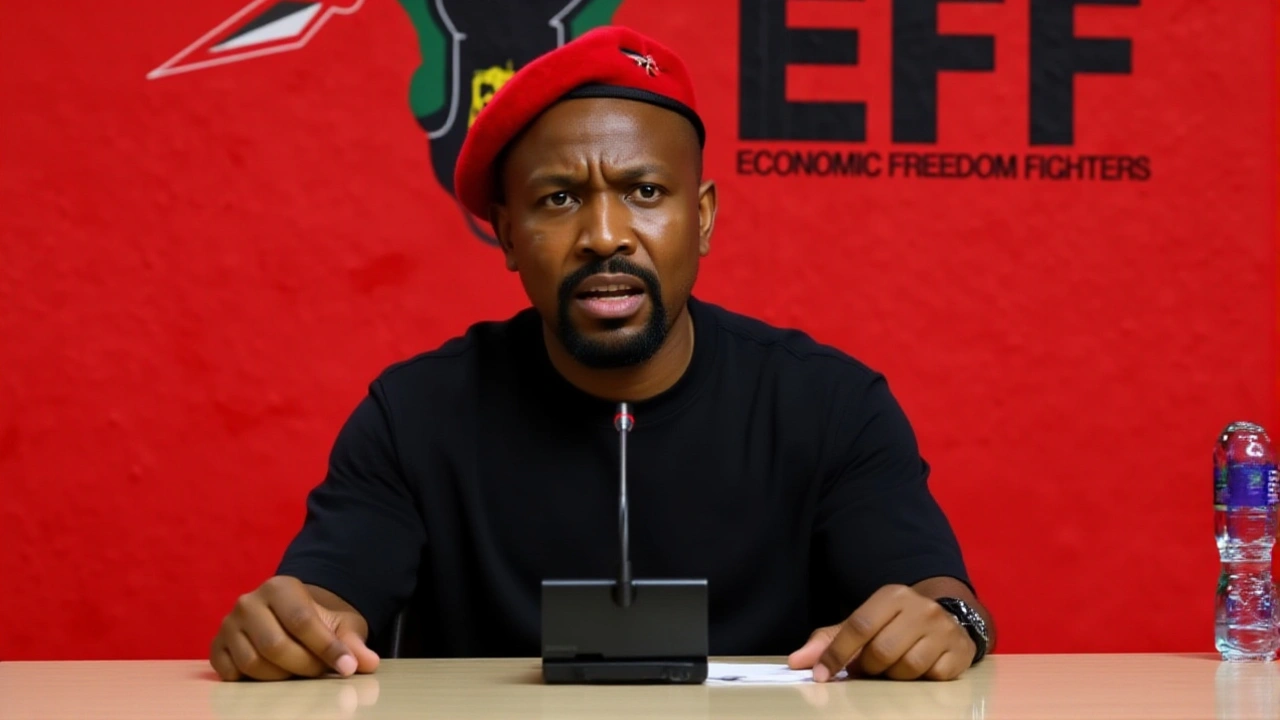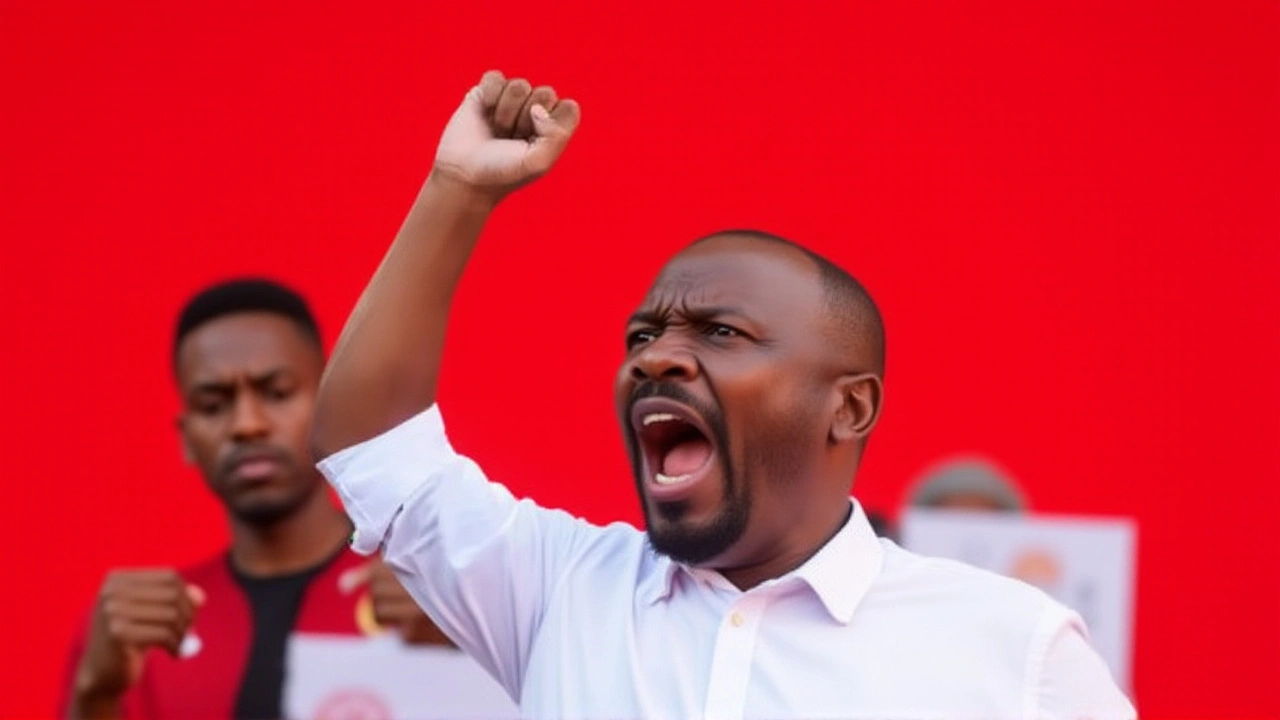Julius Malema convicted, says prison is a badge of honour

When Julius Malema, leader of Economic Freedom Fighters was handed a guilty verdict on October 1, 2025, the streets outside the East London Magistrate's Court in the Eastern Cape erupted with his defiant chant that prison was a badge of honour. The conviction, for discharging a firearm in public during the party’s 5th‑anniversary rally at Sisa Dukashe Stadium in Mdantsane, carries a maximum term of 15 years and sets the stage for a pre‑sentencing hearing on January 23, 2026.
Background: The 2018 anniversary celebration
The EFF – South Africa’s third‑largest political party – marked its fifth year in 2018 with a flamboyant rally that blended speeches, music and, according to court evidence, a real firearm that Malema allegedly fired into the air. The incident was captured by several attendees and later entered the docket as a case of unlawful discharge of a weapon in a public venue.
His former bodyguard, Adriaan Snyman, faced separate charges for unlawful possession of the gun and ammunition. Both men argued that the prosecution’s case was built on politically motivated evidence, a claim that has echoed through many of Malema’s previous court battles.
Court proceedings and the guilty verdict
The trial, presided over by magistrate Tonet Olifir, unfolded over several weeks. Prosecutors presented ballistic reports, eyewitness testimony, and the firearm itself, which forensic analysis confirmed had been discharged during the rally.
When the verdict was read, Malema’s supporters shouted slogans while Malema himself stepped outside the courthouse, declaring the judgment "fundamentally flawed" and insisting that facing prison or death was a mark of honor for any revolutionary.
He also launched a pointed attack on the magistrate, accusing her of being ill‑prepared and even suggesting that a black female judge would have received a different treatment. The comments sparked immediate condemnation from legal observers who warned that such rhetoric could inflame public distrust in the judiciary.
Reactions: Opposition, party loyalists and the judiciary
Opposition figures were quick to weigh in. Ian Cameron, a Member of Parliament for the Democratic Alliance, labelled Malema a "symbol of chaos and violence" and warned that handing a gun to a political leader was a reckless act that undermined the rule of law. "If someone told me to jump off a roof, I hope I wouldn’t obey just because they said so," Cameron said, drawing a stark analogy to Malema’s defence.
Within the EFF, the response was uniformly supportive. Party spokespersons framed the case as yet another chapter in a long history of state‑sponsored persecution, pointing to past prosecutions for alleged money‑laundering and incitement as evidence of a pattern.
Legal experts, however, cautioned that the forthcoming sentencing could have real consequences for the party’s parliamentary standing. South Africa’s Constitution allows a party leader to retain a seat while under trial, but a lengthy imprisonment could trigger a leadership vacuum and force a by‑election in the party’s national list.

Legal and political implications
The potential 15‑year sentence is not merely a personal blow; it reverberates across the South African political spectrum. If Malema is incarcerated, the EFF would need to appoint an interim leader, a move that could shift internal power dynamics and test the party’s cohesion.
Furthermore, the case highlights the broader issue of political violence in the country. According to a 2023 report by the Institute for Security Studies, incidents involving weapons at political rallies have risen by 12% since 2015, underscoring a growing trend that threatens democratic stability.
From a constitutional perspective, the case also raises questions about the balance between free expression and public safety. While the EFF argues that the firearm discharge was a symbolic act of protest, the law clearly categorises such behaviour as a criminal offence, regardless of political intent.
What lies ahead: Sentencing and the future of the EFF
Malema’s next court appearance on January 23, 2026, will focus on sentencing. The magistrate will consider mitigating factors – including the defendant’s political stature, the absence of physical injury, and his clean criminal record prior to this charge – against aggravating circumstances like the public nature of the offence.
Should a custodial sentence be imposed, the EFF’s parliamentary representation could be jeopardised if the party’s constitution requires the leader to be an active member of the National Assembly. Some analysts predict that the party may push for a constitutional amendment to allow a non‑member to head the party, a move that would spark an intense national debate.
Beyond the courtroom, the verdict fuels an ongoing narrative about the rule of law in South Africa. For supporters, Malema’s defiant stance – “prison is a badge of honour” – reinforces his image as a martyr fighting an entrenched elite. For critics, it underscores a dangerous entitlement that places political ambition above public safety.
Key facts
- Verdict handed down: 1 October 2025 by the East London Magistrate's Court.
- Charge: Discharging a firearm in public during the EFF’s 5th‑anniversary rally (2018).
- Maximum penalty: 15 years imprisonment.
- Pre‑sentencing hearing scheduled for 23 January 2026.
- Co‑defendant: former bodyguard Adriaan Snyman, charged with unlawful possession.

Frequently Asked Questions
How could a prison sentence affect Julius Malema’s role in the EFF?
If Malema receives a custodial sentence longer than a few months, the party’s constitution may compel him to step down as parliamentary leader, triggering an internal election. The EFF would then need to appoint an interim head, potentially reshaping its policy direction and public image.
What legal precedent does this case set for political leaders in South Africa?
The conviction reinforces that political status does not grant immunity from firearms legislation. Previous cases, such as the 2022 conviction of a provincial mayor for illegal weapons possession, show a growing willingness of courts to hold elected officials accountable.
Why did Malema describe prison as a ‘badge of honour’?
Malema frames incarceration as a symbol of struggle against what he portrays as a hostile, elite‑driven state. This rhetoric is consistent with his long‑standing narrative of being persecuted for championing the poor and marginalized.
What has been the reaction from South Africa’s judiciary to Malema’s comments about the magistrate?
Legal commentators have warned that Malema’s personal attacks risk undermining public confidence in the courts. The Judicial Service Commission issued a statement urging all politicians to respect judicial independence, emphasizing that criticism must be constructive, not personal.
Could this conviction influence future election outcomes for the EFF?
Polls conducted in August 2025 showed the EFF hovering at 12% of the national vote. A high‑profile conviction may polarise voters: loyal supporters could rally around Malema’s martyrdom narrative, while undecided voters might be deterred by the party’s association with violence.






Ashley Bradley
October 3, 2025 AT 05:45Malema’s courtroom theatrics echo a broader pattern where political figures treat legal repercussions as badges of resistance. The rhetoric frames incarceration as a symbol of struggle rather than accountability. While such narratives can galvanize a base, they risk normalizing violent dissent. The legal system’s impartiality is crucial for democratic stability, regardless of a leader’s popularity. Ultimately, the verdict tests the EFF’s commitment to lawful protest.
Joe Delaney
October 8, 2025 AT 08:34That’s a classic move – turning a sentence into a rallying cry.
Ruben Vilas Boas
October 13, 2025 AT 11:24Honestly, it’s wild how quickly some folks jump from courtroom drama to championing chaos. The EFF’s narrative feels more about self‑promotion than genuine reform. Yet supporters see it as proof of the system’s bias, which fuels further division. It’s a cycle that doesn’t help anyone.
George Thomas
October 18, 2025 AT 14:13From a procedural standpoint, the magistrate adhered to statutory requirements, presenting ballistic evidence and eyewitness accounts. The conviction aligns with established firearms legislation, irrespective of political motivations. While Malema’s remarks challenge judicial independence, they do not alter the legal precedent set.
Michelle Linscomb
October 23, 2025 AT 17:03The EFF’s fervent defense of Maloma’s actions is nothing short of a strategic deflection. By casting the judiciary as a tool of oppression, they attempt to reframe a clear violation of public safety into a heroic stand. This tactic not only undermines the rule of law but also risks emboldening future political figures to flout regulations without fear of consequence. The pattern of portraying legal setbacks as martyrdom is a corrosive narrative that erodes public trust. Moreover, the potential 15‑year sentence could fracture the party’s leadership structure, forcing an expedited power shuffle that may destabilize internal cohesion. If the EFF pursues a constitutional amendment to allow a non‑member leader, it would set a dangerous precedent for other parties. Critics argue that such maneuvers prioritize personal ambition over democratic principles. In the long run, the party’s credibility hinges on whether it can separate ideological zeal from unlawful conduct. The courts, meanwhile, must remain vigilant in applying the law impartially, regardless of political pressure. Ultimately, this case serves as a litmus test for South Africa’s commitment to equal justice under the law.
John McDonald
October 28, 2025 AT 18:52From a policy analysis lens, the conviction underscores a critical intersection of security protocols and political expression. The statutory framework governing firearm discharge is unequivocal; any deviation, especially in a mass gathering, triggers mandatory penal provisions. Leveraging this case as a catalyst for legislative refinement could enhance deterrence mechanisms while preserving constitutional freedoms. Stakeholders should consider integrating risk assessment matrices into event licensing to preemptively mitigate such infractions.
Jordyn Wade
November 2, 2025 AT 21:42It’s fascinating to watch how a single courtroom decision can ripple through an entire political ecosystem, reshaping power dynamics and public perception alike. First, the conviction starkly illustrates that legal accountability does not vanish in the face of charismatic leadership, reinforcing the principle that no individual stands above the law. Second, the EFF’s immediate framing of the verdict as persecution serves to solidify its core supporters’ loyalty, turning a potential vulnerability into a rallying point. Third, the impending sentencing will inevitably test the party’s structural resilience, prompting internal debates about succession planning and governance continuity. Fourth, should the sentence be lengthy, the constitutional provision allowing a leader to retain a parliamentary seat while incarcerated may become a contentious focal point, potentially sparking legislative amendments. Fifth, the broader political arena will likely witness an intensified discourse on the acceptable boundaries of protest, especially concerning the deployment of weapons at public events. Sixth, civil society groups may seize this moment to advocate for stricter enforcement of public safety regulations, thereby influencing future policy directions. Seventh, the media narrative will oscillate between portraying Malema as a martyr for the oppressed and as a reckless provocateur, shaping voter sentiment in upcoming elections. Eighth, international observers might interpret this case as a barometer of South Africa’s commitment to democratic norms, affecting foreign diplomatic and investment considerations. Ninth, the judiciary’s handling of the case will send a signal to other political actors about the seriousness with which the courts will treat breaches of the law, potentially deterring similar conduct. Tenth, the EFF’s internal discourse will likely involve a reevaluation of its strategic messaging, balancing revolutionary rhetoric with pragmatic compliance. Eleventh, the legal precedent set here could influence how future cases involving political figures and weapon-related offenses are adjudicated. Twelfth, the public’s reaction-whether it leans toward empathy for perceived oppression or condemnation of violent tactics-will shape the societal narrative around accountability and leadership. Thirteenth, the case may inspire academic inquiries into the intersection of law, politics, and social movements, enriching scholarly debate. Fourteenth, grassroots activists might leverage the situation to mobilize for broader reforms targeting political violence. Fifteenth, ultimately, the outcome will contribute to an ongoing dialogue about the balance between dissent, security, and democratic integrity in a vibrant but complex political landscape.
Zoe Birnbaum
November 8, 2025 AT 00:31Wow, talk about drama! The courtroom turned into a stage, and the crowd went wild. This is the kind of stuff that keeps the political soap opera alive. Can't wait to see what the next episode brings.
Amber Brewer
November 13, 2025 AT 03:20From a legal standpoint, the conviction reinforces the principle that firearm offenses are taken seriously, irrespective of political status. The court’s reliance on ballistic evidence and eyewitness testimony underscores the robustness of the prosecution’s case. This sets a clear precedent for future incidents involving weapons at public gatherings.
Kim Coulter
November 18, 2025 AT 06:10Malema’s narrative is a textbook example of turning personal accountability into a badge of honor for the masses. By recasting a criminal act as a revolutionary act, he fuels the myth of the oppressed leader fighting a corrupt elite. This approach not only destabilizes the rule of law but also galvanizes an already volatile political base, pushing the boundaries of acceptable discourse.
Michelle Toale-Burke
November 23, 2025 AT 08:59That’s wild 😲 the guy actually thinks a jail cell is a trophy case for his ego. Can’t help but wonder what the next stunt will be 🤔
Amy Paradise
November 28, 2025 AT 11:49Honestly it’s a bit crazy how quickly some folks jump from a courtroom verdict to treating it like a badge of honor. The EFF seems to be using it to rally their base rather than reflect on the seriousness of weapon discharge in public. It’s definitely a narrative that could polarise even more people.
Janette Cybulski
December 3, 2025 AT 14:38Yo, this whole thing feels like something straight out of a reality TV show. One minute you’re watching a trial, next you’ve got crowds chanting about prison being a status symbol. The drama is real, but the stakes are higher than any TV plot.
Mildred Alonzo
December 8, 2025 AT 17:27the judgement really highlights how what can happen when a leader throws the law out the window
Elizabeth Bennett
December 13, 2025 AT 20:17The conviction is a stark reminder that political clout does not grant immunity from firearm statutes. While the EFF’s supporters may view this as persecution, the legal framework is explicit about prohibitions on discharging weapons in public spaces. This case will likely influence future discourse on the balance between protest symbolism and public safety.
linda menuhin
December 18, 2025 AT 23:06Interesting how the whole thing kinda shows the power of narrative. Like, turning a crime into a martyrdom story can really shift how people see it. It’s both clever and kinda dangerous, ya know?
Jeff Abbott
December 24, 2025 AT 01:56Honestly, the whole "badge of honour" thing is just a pathetic attempt to romanticise criminal behaviour. It’s a lazy excuse to blame the system for personal ambition. This kind of rhetoric only fuels division and undermines any real progress.
Quinton Merrill
December 29, 2025 AT 04:45Curious how the legal ramifications will reshape the party’s internal dynamics 🤔. If Malema faces a lengthy sentence, who steps up and how will that affect the EFF’s strategy? 😅